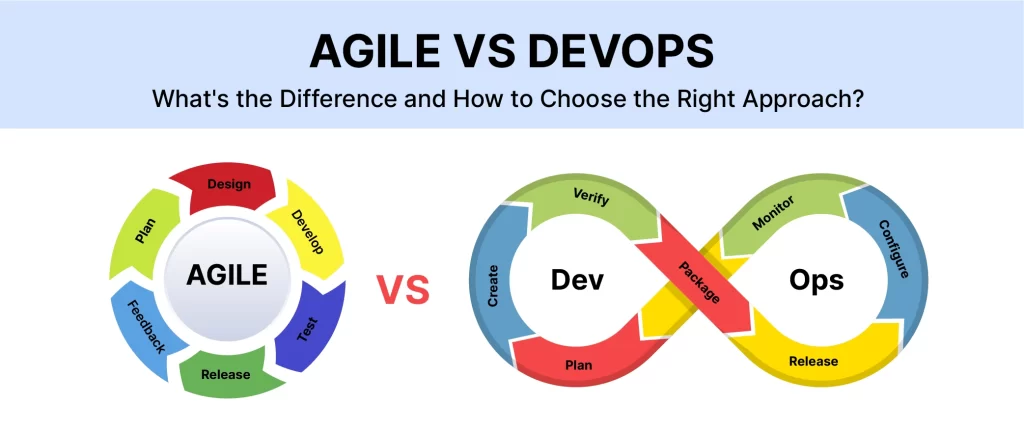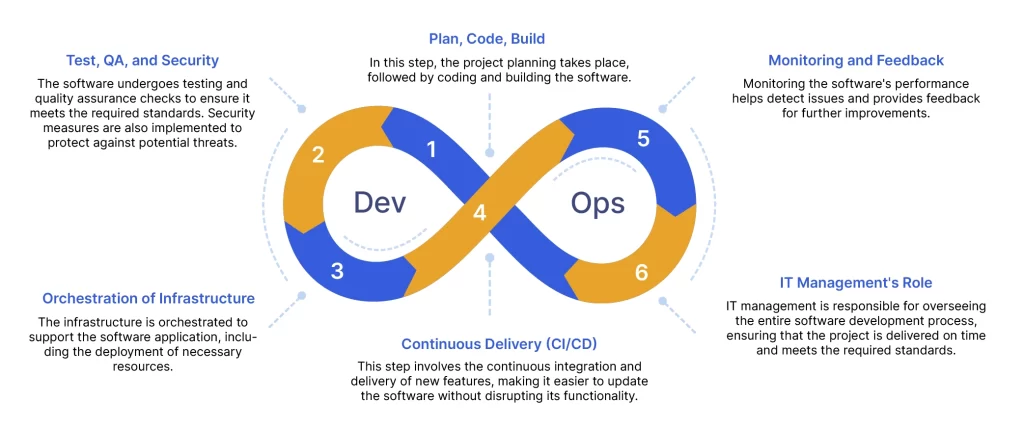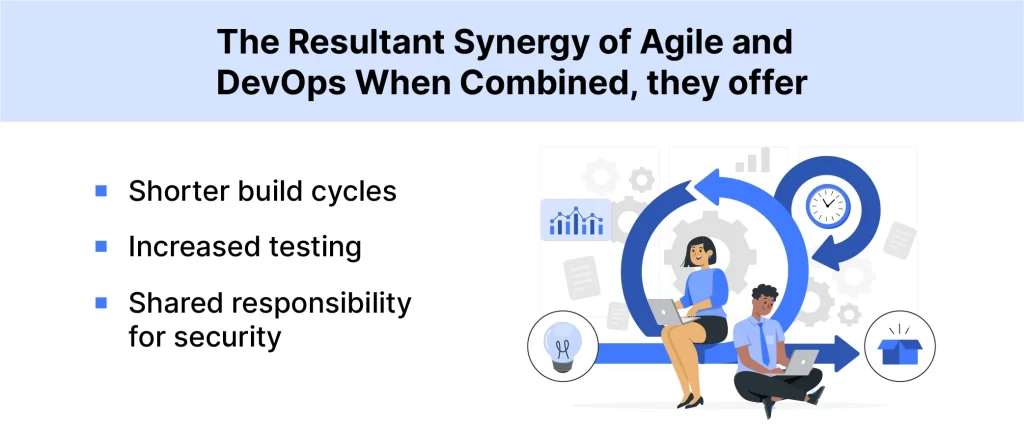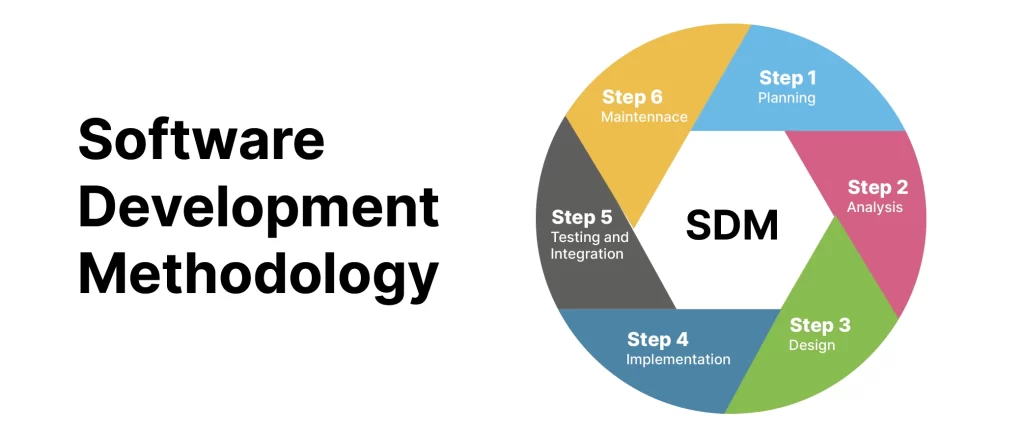“When teams operate independently, it creates communication gaps that can lead to disorder. In contrast, when teams collaborate, they tend to be more efficient.”
Agile vs DevOps; two kinds of methodologies in software development that share a common goal of delivering high-quality products efficiently and quickly. Despite their similarities, these practices can cause confusion. Many organizations wonder what each methodology entails, where they overlap, and whether they complement or compete with each other. To clarify these questions, we have generated this article that focuses on Agile and DevOps methodologies within the variety of approaches adopted by organizations.
DevOps and Agile are two distinct methodologies and each has its own set of advantages and disadvantages. However, it is beneficial to combine them for better productivity. Teams should strive to leverage both approaches to improve their speed and efficiency. Let’s explore the DevOps and Agile methodologies in-depth.

DevOps generally means Developer’s Operations that align development and IT operations to improve productivity and collaboration. Its primary goal is to continuously deliver quality software. DevOps methodologies are underpinned by a set of core principles, including continuous integration, delivery, testing, deployment, operations, and collaboration. DevOps benefits include faster, reliable, and easily integrated deployments.
Agile is an iterative approach to software development that values collaboration, customer feedback, and quick releases. It breaks down processes into smaller sprints and prioritizes working software over comprehensive documentation. Agile also emphasizes customer collaboration and responsiveness to change over following a rigid plan. Its core values include valuing individuals over processes, delivering software over documentation, continuous customer collaboration, and responding to change. Agile can be implemented using tools such as Kanban board, Scrum, XP, Active Collab, etc.
Agile and DevOps share fundamental similarities and can create synergy in software development. By combining their different strengths, they can enhance productivity and improve software quality.

Agile provides Scrum team methods, customer stories, smaller projects, and risk-free environments for experimentation. It also offers specialized job roles, consistent governance, and standards. Agile has backlog management, sprint ceremonies, and daily stand-ups. The process approach helps manage work and team contributions.
On the other hand, DevOps adds external feedback loops, automation, microservices, and organization-wide engagement. It also focuses on repetitive work automation, security literacy, and compliance. DevOps uses containers, infrastructure as code, and monitoring automation to streamline development and deployment.

The result is a scalable, secure, and efficient infrastructure with increased reliability and sustainability. Teams benefit from upskilling and better collaboration, resulting in smoother operations and modernized IT assets.
Agile and DevOps share commonalities throughout the software development lifecycle such as;
However, the Agile-DevOps synergy helps teams meet both ends with expectations, fulfil service level agreements, and proactively address issues through metrics and continuous improvement.
The DevOps approach emphasizes automation of the entire CI/CD pipeline, continuous testing, and delivery to ensure frequent releases are successful. IT Operations teams aim to scale the software development process to accelerate writing and updating code and updating features within the IT team.
At Intellicoworks DevOps teams work with the latest tools and technologies such as Terraform, AWS, Ansible, and Kubernetes to streamline the software development process.
Agile is an iterative approach to software development that values collaboration, customer feedback, and quick releases. It breaks down processes into smaller units called sprints and focuses on incremental deployments of each sprint, integrating them for final testing.
The ideal software development methodology entails:
With a focus on handling customer personas, preventing technical debt, and incorporating customer feedback. AI/ML-based recommendation systems can help streamline the process and ensure high-quality product development from day one.

Frequent iterations help the development team understand what’s working and what’s not, but it can be time-consuming. Therefore, AI/ML-based recommendation systems can help streamline the process and ensure high-quality product development from day one.
Agile and DevOps share similar principles and goals but have different focuses. Agile emphasizes collaboration between developers and product management, iterative development, and small batches, while DevOps extends the focus to delivery and maintenance, test and delivery automation, and unplanned work common to operations teams. However, both prioritize individuals and interactions, working software, customer collaboration, and responding to change. The Twelve Principles of Agile Software also reference DevOps principles such as continuous integration and delivery, working in small batches with frequent releases, and using automation.
Businesses today face immense pressure to deliver software that is fast, efficient, and of high quality. Agile and DevOps offer different approaches to achieve these goals, but the question remains: can they be used together? The answer is yes! By combining the two methodologies, organizations can benefit from increased efficiency, faster delivery, and improved quality. The key is to find the right balance between the two, using Agile to manage development and DevOps to enable rapid delivery and deployment. So why choose one over the other when you can have the best of both worlds?
The bottom line is that both Agile and DevOps methodologies have their unique strengths and can be used in tandem to improve overall productivity and software quality. While Agile emphasizes collaboration and iterative development, DevOps extends the focus to delivery and maintenance, automation, and unplanned work common to operations teams. At IntellicoWorks, we offer top-notch DevOps Services to help your organization accelerate software delivery, reduce time-to-market, and improve customer satisfaction. Our team of experts can help you adopt DevOps practices, automate your CI/CD pipeline, and continuously monitor your applications for improved performance.

Talk to us and let’s build something great together
A Subsidiary of Vaival Technologies, LLC
IntelliCoworks is a leading DevOps, SecOps and DataOps service provider and specializes in delivering tailored solutions using the latest technologies to serve various industries. Our DevOps engineers help companies with the endless process of securing both data and operations.
Ops
Cloud
AI & ML
Copyrights © 2023 byIntellicoworks. All rights reserved.